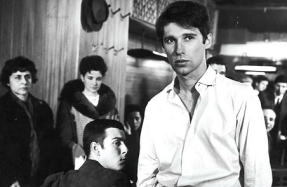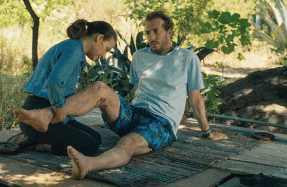New Possible Realities

The Last City, the new film by Heinz Emigholz, begins with a confession. “And it was a straight lie when I told you that I had an image that could describe the state of my depression,” admits a middle-aged archaeologist to a weapons designer (played, respectively, by John Erdman and Jonathan Perel, who were previously seen in Emigholz’s 2017 film Streetscapes [Dialogue] as a filmmaker and his analyst). “I made that up.” Part reintroduction, part recapitulation, this abrupt admission sets the conceptual coordinates for a film that, despite its presentation and the familiarity of its players, is less a continuation of that earlier work’s confessional mode of address than a creative reimagining of its talking points. One of Streetscapes [Dialogue]’s key attributes is its autobiographical framework: with conversations sourced from Emigholz’s own therapy sessions, it’s a film that revealed more about the director than anyone could have ever imagined. Just as important, it also inaugurated a return to narrative filmmaking following over two decades of observational documentaries, most of them about architecture. Now fully reinvigorated, Emigholz is freely indulging his impulses, applying nearly a half-century’s worth of experience to the kind of films he had always imagined making. “Do you remember when I told you about the feature film I wanted to make—the one with the five cities?” the archaeologist continues later in the opening scene. “I really didn’t want to make the film at all.”
Another lie. Opening in Be’er Sheva and set alternately in Athens, Berlin, Hong Kong, and São Paulo, embarks on a roundabout trip through these picturesque locations, taking in their striking landscapes and architecture in a manner (static shots, canted angles) akin to the director’s documentary work. Only now, with no recourse to autobiography, Emigholz has leapt headfirst into the realm of absurdist fiction. Against these backdrops, pairs of alternating actors in different roles engage in extended conversations about love and weaponry, social taboos, generational conflict, war guilt, and the origins of the universe, all in a highly mannered style that emphasizes the essentially irreducible nature of the topics broached. In Athens, an older artist (Erdman) meets a projection of his younger self (Young Sun Han), who fears falling into a life of drug use; in Berlin, two brothers, a priest and a policeman (Young and Laurean Wagner), attempt to reconcile their incestuous relationship with their professional personas and the love of their
You’re reading a preview, subscribe to read more.
Start your free 30 days





